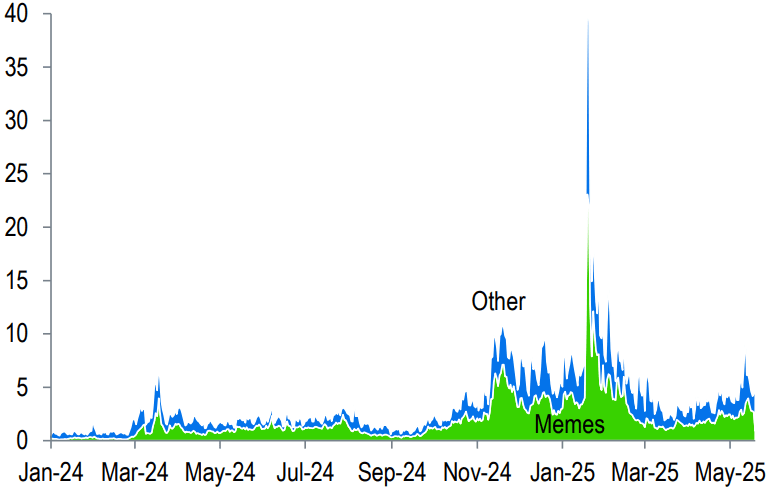Author: Adrian Zmudzinski
Compiled by: Tim, PANews
According to a recent report by Standard Chartered, the Layer 1 blockchain Solana may be evolving into a 'single-function platform' that focuses solely on generating and trading Meme coins.
According to a research report from May 27, Solana dominates the public chain sector with high trading volume and low transaction costs, thanks to its fast and low-cost transaction confirmation architecture. However, this technical advantage has led to an unintended consequence: so far, it has mainly concentrated on Meme coin trading, which accounts for most of the activity on Solana (measured by 'GDP', i.e., application revenue).
Standard Chartered stated that the Meme coin craze posed a stress test for Solana's scalability, but the volatility and speculative nature of such assets also brought drawbacks. As Meme coin trading volume declines, the bank warns that Solana may struggle to maintain its momentum.
The Meme frenzy has passed its peak
The report indicates that the frenzy for Meme coins based on Solana has peaked, and the decline in usage combined with 'cheap' transactions is not an ideal combination. The bank suggests that Solana should expand into other fields that require a large number of low-cost, fast transaction processing, such as financial settlement, decentralized cloud computing, or real-time data exchange, which are in line with its blockchain's high throughput characteristics.

Solana decentralized exchange trading volume. Source: Standard Chartered
According to the report, these fields may include traditional consumer applications such as high-throughput financial applications and social media. However, the bank pointed out that scaling such applications may take years, which could have serious consequences for Solana. If progress falls short of expectations, its market competitiveness, developer ecosystem, and platform reputation may suffer significant blows, and its valuation could face substantial downward pressure.
Therefore, we expect that in the next two to three years, Solana's performance will lag behind Ethereum, and only after that will it catch up, at least in terms of actual value.

Standard Chartered's cryptocurrency target price. Source: Standard Chartered
The advantages of Solana are gradually disappearing
Solana has long positioned itself as a fast, low-cost L1 public chain that supports smart contracts, directly competing with Ethereum. However, this advantage may be gradually weakening.

Average transaction fees for Solana and Arbitrum. Source: Standard Chartered
Since the Dencun network upgrade in March 2024, Ethereum's second-layer platform has surpassed Solana in terms of average transaction costs. This shift puts pressure on Solana's value proposition as 'the cheapest high-throughput blockchain.' Standard Chartered noted that Ethereum achieves more efficient scaling while maintaining decentralization by modularly separating data availability, execution, and consensus: 'The modular solution allows Ethereum to scale transaction processing at low costs (after the Dencun upgrade) while maintaining the high decentralization security advantages of the mainnet.'



